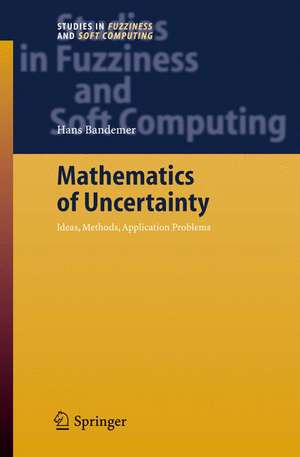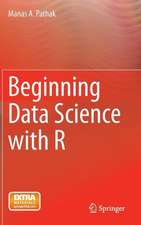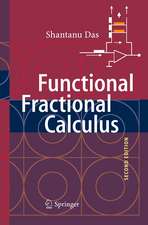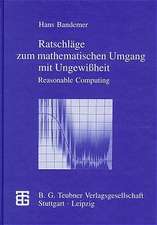Mathematics of Uncertainty: Ideas, Methods, Application Problems: Studies in Fuzziness and Soft Computing, cartea 189
Autor Hans Bandemeren Limba Engleză Hardback – 3 noi 2005
| Toate formatele și edițiile | Preț | Express |
|---|---|---|
| Paperback (1) | 940.25 lei 6-8 săpt. | |
| Springer Berlin, Heidelberg – 30 noi 2010 | 940.25 lei 6-8 săpt. | |
| Hardback (1) | 946.24 lei 6-8 săpt. | |
| Springer Berlin, Heidelberg – 3 noi 2005 | 946.24 lei 6-8 săpt. |
Din seria Studies in Fuzziness and Soft Computing
- 20%
 Preț: 999.85 lei
Preț: 999.85 lei - 20%
 Preț: 653.06 lei
Preț: 653.06 lei - 20%
 Preț: 872.96 lei
Preț: 872.96 lei - 20%
 Preț: 930.57 lei
Preț: 930.57 lei - 20%
 Preț: 1051.00 lei
Preț: 1051.00 lei - 20%
 Preț: 992.44 lei
Preț: 992.44 lei - 20%
 Preț: 655.85 lei
Preț: 655.85 lei - 20%
 Preț: 1001.86 lei
Preț: 1001.86 lei - 18%
 Preț: 954.14 lei
Preț: 954.14 lei - 20%
 Preț: 330.10 lei
Preț: 330.10 lei - 20%
 Preț: 333.04 lei
Preț: 333.04 lei - 20%
 Preț: 997.56 lei
Preț: 997.56 lei -
 Preț: 391.61 lei
Preț: 391.61 lei - 20%
 Preț: 647.79 lei
Preț: 647.79 lei - 20%
 Preț: 986.01 lei
Preț: 986.01 lei - 18%
 Preț: 958.56 lei
Preț: 958.56 lei - 20%
 Preț: 996.40 lei
Preț: 996.40 lei - 20%
 Preț: 999.35 lei
Preț: 999.35 lei - 15%
 Preț: 646.43 lei
Preț: 646.43 lei - 20%
 Preț: 651.57 lei
Preț: 651.57 lei - 20%
 Preț: 997.89 lei
Preț: 997.89 lei - 15%
 Preț: 641.03 lei
Preț: 641.03 lei - 20%
 Preț: 1009.74 lei
Preț: 1009.74 lei - 20%
 Preț: 992.62 lei
Preț: 992.62 lei -
 Preț: 388.72 lei
Preț: 388.72 lei - 18%
 Preț: 1223.43 lei
Preț: 1223.43 lei - 20%
 Preț: 651.42 lei
Preț: 651.42 lei - 18%
 Preț: 951.59 lei
Preț: 951.59 lei - 18%
 Preț: 948.61 lei
Preț: 948.61 lei
Preț: 946.24 lei
Preț vechi: 1153.95 lei
-18% Nou
Puncte Express: 1419
Preț estimativ în valută:
181.06€ • 189.04$ • 149.85£
181.06€ • 189.04$ • 149.85£
Carte tipărită la comandă
Livrare economică 04-18 aprilie
Preluare comenzi: 021 569.72.76
Specificații
ISBN-13: 9783540284574
ISBN-10: 3540284575
Pagini: 208
Ilustrații: XIV, 190 p.
Dimensiuni: 155 x 235 x 17 mm
Greutate: 0.47 kg
Ediția:2006
Editura: Springer Berlin, Heidelberg
Colecția Springer
Seria Studies in Fuzziness and Soft Computing
Locul publicării:Berlin, Heidelberg, Germany
ISBN-10: 3540284575
Pagini: 208
Ilustrații: XIV, 190 p.
Dimensiuni: 155 x 235 x 17 mm
Greutate: 0.47 kg
Ediția:2006
Editura: Springer Berlin, Heidelberg
Colecția Springer
Seria Studies in Fuzziness and Soft Computing
Locul publicării:Berlin, Heidelberg, Germany
Public țintă
ResearchCuprins
Mathematical Representation of Simple Data and Connections.- Specification and Use of Observation Fuzziness.- Specification and Use of Uncertain Variability.- Specification of Vagueness of Statements on Sets.- Methods from Qualitative Data Analysis.- Evaluation of Functional Relationships.- Outlook and Conclusions.
Recenzii
From the reviews
"This monograph is an English translation of the German original from 1997 … . The book is intended to assist practitioners to successfully use mathematical resources when dealing with uncertainty. … the ideas presented in this book remain valid and helpful especially for practitioners in helping them to decide for an appropriate software tool when dealing with data suffering from uncertainty." (Radko Mesiar, Zentralblatt MATH, Vol. 1084, 2006)
"This book is about mathematical modeling and analysis of uncertainty in real-world problems. … The book is recommended for all who deal with complex data, especially in the social sciences and intelligence technology." (Hung Trung Nguyen, Mathematical Reviews, Issue 2007 b)
"This monograph is an English translation of the German original from 1997 … . The book is intended to assist practitioners to successfully use mathematical resources when dealing with uncertainty. … the ideas presented in this book remain valid and helpful especially for practitioners in helping them to decide for an appropriate software tool when dealing with data suffering from uncertainty." (Radko Mesiar, Zentralblatt MATH, Vol. 1084, 2006)
"This book is about mathematical modeling and analysis of uncertainty in real-world problems. … The book is recommended for all who deal with complex data, especially in the social sciences and intelligence technology." (Hung Trung Nguyen, Mathematical Reviews, Issue 2007 b)
Textul de pe ultima copertă
"Mathematics of Uncertainty" provides the basic ideas and foundations of uncertainty, covering the fields of mathematics in which uncertainty, variability, imprecision and fuzziness of data are of importance. This introductory book describes the basic ideas of the mathematical fields of uncertainty from simple interpolation to wavelets, from error propagation to fuzzy sets and neural networks. The book presents the treatment of problems of interpolation and approximation, as well as observation fuzziness which can essentially influence the preciseness and reliability of statements on functional relationships. The notions of randomness and probability are examined as a model for the variability of observation and measurement results. Besides these basic ideas the book also presents methods of qualitative data analysis such as cluster analysis and classification, and of evaluation of functional relationships such as regression analysis and quantitative fuzzy data analysis.
Caracteristici
Provides basic ideas and mathematical foundations of uncertainty Gives practical advices how to mathematically include uncertainty and vageness inherent in practical problems and data Includes supplementary material: sn.pub/extras



























